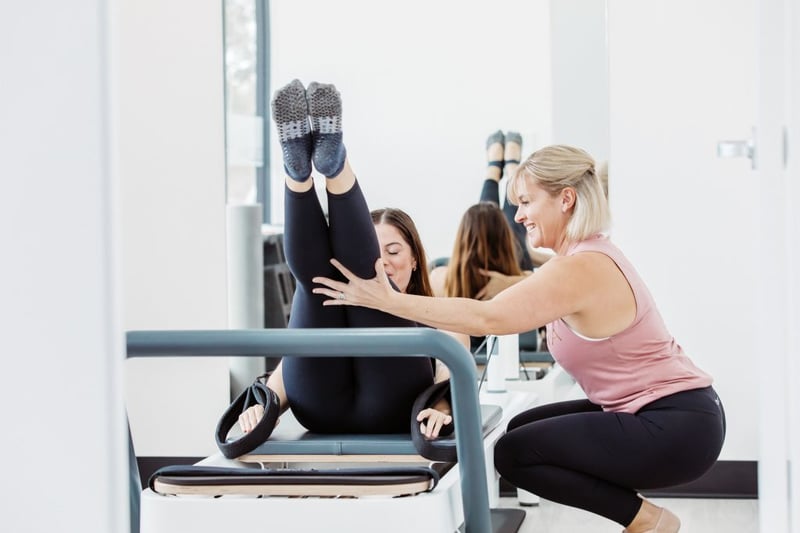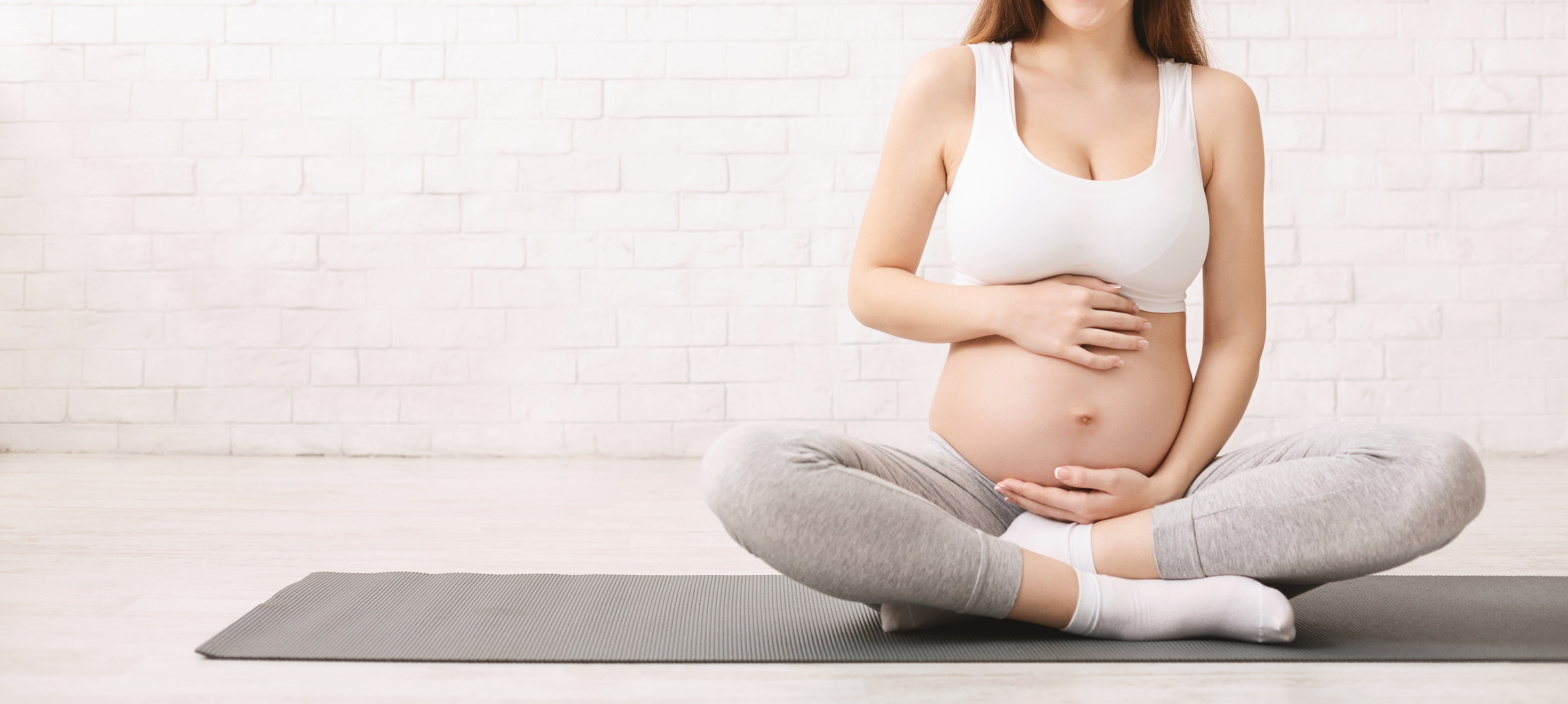Pregnancy is an incredible journey filled with changes and new experiences. With the extra weight and strain, pregnancy can really affect your body and muscles. That’s why, many women decide to stop exercising while pregnant out of fear of hurting their unborn babies or injuring themselves.
However, a number of studies have shown that exercising while pregnant is not only completely safe, but it also offers a range of benefits that can make pregnancy – and even labour – easier.
Pilates is a fantastic option that many expectant mothers are exploring, and for good reason! Known for its focus on core strength, flexibility, and gentle movements, Pilates can be a great way to maintain fitness and support your body as it changes.
But, you might be asking, “Is it safe to do Pilates while pregnant?” and “How can I adapt my routine to make sure it’s right for me?” Whether you're a Pilates enthusiast or just starting to think about incorporating it into your pregnancy routine, we discuss everything you need to know.
Is it Safe to Do Pilates While Pregnant?
So, is Pilates safe during pregnancy? Absolutely! Pilates is not only safe but highly beneficial for expectant mothers.
It offers a wide range of exercises and modifications tailored to every stage of pregnancy, making it suitable for both beginners and seasoned Pilates goers. While Pilates is commonly practiced on a mat, there’s also special lightweight equipment available that targets specific muscles, providing additional support. It focuses on breath control and targeted movements to help improve balance, strength, mobility, and flexibility.
However, if you have certain high-risk conditions, such as specific heart or lung issues, placenta previa, or concerns that could lead to preterm labour, it's essential to consult with your doctor before starting or continuing your Pilates practice. They can offer guidance tailored to your individual circumstances.

The Benefits Of Fitness During Pregnancy
Pregnancy is an amazing journey, but it also brings a host of physical changes. As your body adapts to support your growing baby, it’s essential to find ways to stay active and balanced.
Alleviating Discomforts and Enhancing Comfort
Many women find that they suffer from aches and pains during pregnancy. One of the most appreciated benefits of Pilates during pregnancy is its ability to reduce these common discomforts.
Regular practice can help relieve backaches, constipation, bloating, and swelling, which are often experienced as your body adapts to pregnancy. Pilates helps stretch and tone your muscles, increase blood circulation, and release tension, which can alleviate aches and pains, particularly in the later months of pregnancy.
Supporting a Smooth Labor and Delivery
Pilates is also beneficial for preparing your body for childbirth. By strengthening your pelvic floor muscles and enhancing your overall physical condition, Pilates may help shorten labour time and make the birthing process smoother. Improved pelvic floor strength contributes to a more comfortable and controlled delivery, potentially easing the physical demands of labour.
Enhancing Overall Well-being
Beyond the physical benefits, Pilates can support your overall well-being in several key ways:
- Better Sleep: Regular Pilates practice can help improve sleep patterns by reducing discomfort and promoting relaxation.
- Easing Tension Headaches: By alleviating muscle tension and improving circulation, Pilates can help reduce the frequency and severity of tension headaches.
- Decreasing Gestational Diabetes Risk: Maintaining a consistent Pilates routine may lower the risk of developing gestational diabetes by supporting overall health and fitness.
- Boosting Energy Levels: Pilates helps increase your energy by improving muscle strength and circulation, making you feel more vibrant and less fatigued.
- Improving Mood: The focus on breathing and gentle movement in Pilates promotes relaxation and helps enhance your mood, reducing stress and improving mental well-being.
Supporting Breathing and Stamina
As your pregnancy progresses, your body experiences increased blood volume and changes in heart rate, which can leave you feeling short of breath. Pilates emphasizes controlled breathing, which not only helps calm your nervous system and lower blood pressure but also builds the stamina required for the mental and emotional aspects of labour and delivery.

Precautions for Prenatal Pilates
While Pilates can be a wonderful addition to your prenatal routine, it’s essential to approach it with care and awareness. Here are some key precautions to keep in mind to ensure a safe and beneficial practice throughout your pregnancy.
Hydration and Overheating
During pregnancy, your body undergoes significant changes, including increased blood flow and respiratory adjustments. Ensure that you drink plenty of water before, during, and after your Pilates sessions. Opt for a cool and comfortable environment to exercise, and listen to your body if you start to feel overheated or fatigued.
Increased Flexibility and Joint Care
Pregnancy hormones cause the connective tissues around your joints to relax, increasing your flexibility. While this can be beneficial, it also means that your joints are more susceptible to misalignments and injuries. Be mindful of this increased mobility and avoid pushing yourself into positions that could strain your joints or exacerbate any previous injuries.
Listening to Your Body
Your body is working hard to accommodate your growing baby, and you may experience fatigue, nausea, or other pregnancy symptoms. Most Pilates exercises are safe with modification, but it’s essential to listen to your body and avoid overexertion. Focus on gentle movements and modifications that accommodate any discomfort or fatigue you might be experiencing.
Adapting to Changes
During pregnancy, your centre of gravity shifts, which can challenge your balance, endurance, and coordination. To avoid complications, minimise exercises that require lying flat on your back, as the expanding uterus can compress the vena cava, restricting blood flow. Using supportive props to elevate your upper body and using a Pilates reformer with an elevated incline can help make exercise easier and help maintain comfort. Avoid exercises performed on your stomach, as this position becomes less comfortable and practical.
Focusing on Comfort and Preparation
As your baby grows, your energy levels may wane. You may find it easier to focus on gentle mobility and stretching to maintain comfort and prepare for labour. Avoid pushing yourself to achieve strength or fitness goals—your body is already preparing for the significant physical demands of childbirth! Embrace modifications that keep you comfortable and support your body’s needs.
.jpg?width=823&height=549&name=2023_AltonSquare_Edited_CPMAR3152%20(3).jpg)
Tips For Doing Pilates During Pregnancy
Pilates during pregnancy can be a wonderful way to stay fit and support your changing body. To ensure a safe and effective practice, consider these essential tips tailored for expectant mothers:
- Work with a Qualified Instructor: Always choose a Pilates instructor who has extensive prenatal training. At Club Pilates, our experienced instructors are familiar with the specific modifications and precautions necessary for a safe and effective prenatal Pilates practice.
- Wear Comfortable Clothing: Opt for light, comfortable clothing that allows for freedom of movement. Proper attire helps you stay focused on your workout without distractions or discomfort.
- Breathe Naturally: Avoid holding your breath during exercises. Focus on maintaining a steady and natural breathing pattern to ensure adequate oxygen flow and reduce unnecessary strain.
- Avoid Hot Pilates: Hot Pilates or exercising in hot and humid conditions is not recommended during pregnancy. Opt for a well-ventilated space that keeps you cool and comfortable.
- Stay Hydrated and Nourished: Always have snacks on hand and drink plenty of water before, during, and after your session. Staying hydrated and well-nourished helps maintain energy levels and supports overall well-being.
- Utilise Equipment: Using Pilates equipment, like the Reformer, can offer additional support and comfort, especially in the later months. They provide resistance training and elevate you off the floor, which can be particularly beneficial as your body changes.
- Adjust Spring Tension on the Reformer: When using the Pilates Reformer, consider using heavier springs for added support during exercises where the carriage supports you, and lighter springs for exercises where you are pushing the weight. This adjustment helps maintain balance and support.
- Take Your Time Getting Up: Be cautious when transitioning from the floor to a standing position. Take your time to avoid dizziness and ensure smooth movement.
- Allow Time To Recover: After your Pilates session, allow yourself time to relax and recover. Rushing through your post-workout routine can reduce the benefits of your routine. Recovery is just as important as the workout itself!
- Enjoy the Process: Most importantly, have fun! Listen to its signals and adapt your practice to meet your needs. Pilates should enhance your well-being and provide you with a positive, supportive experience throughout your pregnancy.
%20(1)%20(1).jpg?width=2500&height=1667&name=DNA_CP-9946(d)%20(1)%20(1).jpg)
Ready for a Fit and Fabulous Pregnancy? Join Us at Club Pilates!
Navigating pregnancy is a unique and transformative experience, and incorporating Pilates into your routine can be a wonderful way to support your body, manage discomfort, and prepare for the journey ahead. With its focus on core strength, flexibility, and breath control, Pilates offers numerous benefits that can enhance your well-being throughout each trimester.
If you’re looking for a great Pilates workout to do while pregnant, Club Pilates is the perfect place for you. Our instructors are specially trained to cater to pregnant women and will help you modify exercises as needed to ensure that you’re getting the most out of your workout.
Come see us today and get started on a safe, healthy pregnancy!


.jpg?width=600&name=CLUB_PILATES-40%20(1).jpg)
